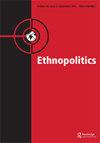Muscular Mediation and Ripeness Theory
IF 1.2
Q3 ETHNIC STUDIES
引用次数: 6
Abstract
Abstract William Zartman’s ‘ripeness’ theory says that parties to a violent conflict will not negotiate sincerely in the absence of a mutually hurting stalemate (MHS). In such circumstances, Zartman recommends a mediator employ coercion by escalating the conflict into a MHS, but the concept is not fully elaborated. Building on Zartman, this article specifies a new theory of ‘muscular mediation’, defined as a powerful mediator using coercion to achieve a mutual compromise that it formulates. The theory is evaluated in three cases from the 1990s: Bosnia, Rwanda, and Kosovo. The article finds that muscular mediation can work but also may backfire by magnifying violence against civilians, especially when all of three adverse conditions are present: (1) the coerced agreement threatens a vital interest of a party; (2) that party has the potential to escalate violence against the opposing side’s civilians; (3) the muscular mediator does not deploy sufficient military forces to deter or prevent such escalation. The article also explores why muscular mediation has been pursued under such adverse conditions. It concludes with advice for prospective muscular mediators.肌肉调节和成熟理论
William Zartman的“成熟”理论认为,在没有相互伤害的僵局(MHS)的情况下,暴力冲突的各方不会真诚地进行谈判。在这种情况下,Zartman建议调解人通过将冲突升级为MHS来使用强制手段,但这个概念并没有完全阐述。在Zartman的基础上,本文提出了一种新的“肌肉调解”理论,它被定义为一种强有力的调解人,使用强制手段来实现它所制定的相互妥协。该理论在20世纪90年代的三个案例中得到了评估:波斯尼亚、卢旺达和科索沃。本文发现,强力调解可以发挥作用,但也可能适得其反,因为它放大了针对平民的暴力,特别是当所有三个不利条件都存在时:(1)强迫协议威胁到一方的重大利益;(2)该当事方有可能使针对对方平民的暴力升级;(3)肌肉调解人没有部署足够的军事力量来阻止或防止这种升级。文章还探讨了为什么肌肉调解一直在这样不利的条件下进行。最后对未来的肌肉调节者提出建议。
本文章由计算机程序翻译,如有差异,请以英文原文为准。
求助全文
约1分钟内获得全文
求助全文

 求助内容:
求助内容: 应助结果提醒方式:
应助结果提醒方式:


